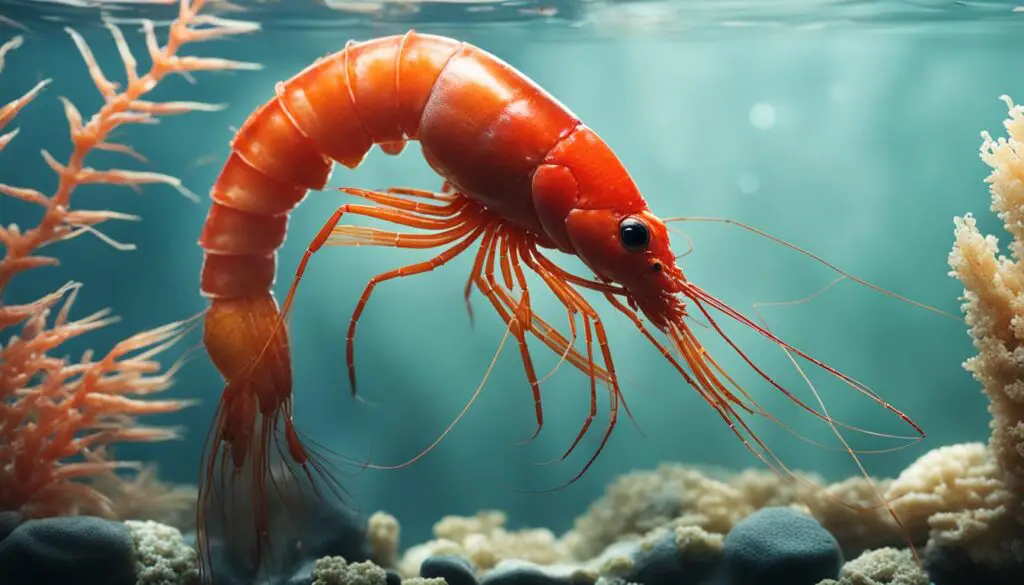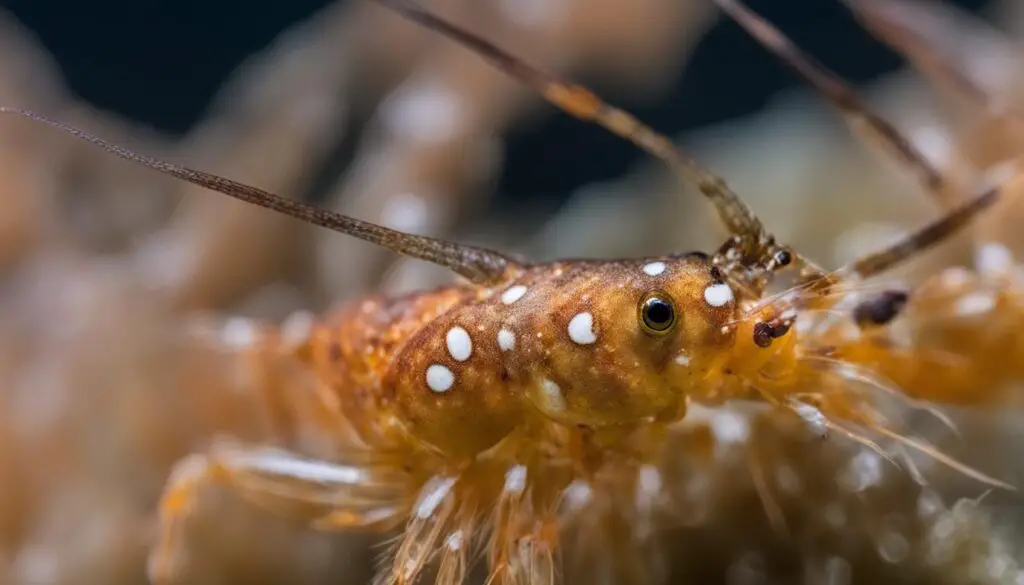Welcome to our aquarium health facts article! Today, we’re going to explore a common question among aquarium enthusiasts: Can shrimp get ick? We’ll dive into the world of shrimp diseases, their susceptibility to illnesses, and how to ensure the well-being of these fascinating creatures in your aquarium.
Key Takeaways
- Shrimp are generally not susceptible to ick due to their hard exoskeleton.
- Although shrimp can carry the parasite, they do not become sick themselves.
- Proper quarantine and tank maintenance are crucial when introducing shrimp to an ick-affected tank.
- While not prone to ick, shrimp can still be susceptible to other diseases and infections.
- Regular observation and maintenance are vital for shrimp health and well-being.
Shrimp and Ick: The Science Behind It
When it comes to the question of whether shrimp can get ick, the answer is no. Shrimp are not susceptible to ick due to their hard exoskeleton, which provides a strong barrier against the parasite. Cryptocaryon irritans, the parasite responsible for causing ick, cannot attach itself to the shells of shrimp, unlike fish. As a result, shrimp do not show any signs of infection or become sick themselves.
However, it is important to note that shrimp can still be carriers of the ick parasite. This means that if you have fish affected by ick in your tank, introducing shrimp can be beneficial. Shrimp can help clean up the parasite without being harmed, making them a valuable addition to an aquarium with fish affected by ick.
To better understand the science behind shrimp’s resistance to ick, it’s helpful to delve into the characteristics of the parasite and the unique attributes of shrimp. Cryptocaryon irritans has specialized structures called tomonts, which attach to the skin and gills of fish, causing the characteristic white spots and other symptoms of ick. However, shrimp’s hard exoskeleton prevents the tomonts from attaching and establishing an infection.
While shrimp play a significant role in eliminating the ick parasite in fish tanks, it’s crucial to remember that they can still be susceptible to other diseases and infections. Proper care, regular observation, and maintaining ideal water conditions are essential for ensuring the overall health and well-being of shrimp in an aquarium.
Shrimp Diseases
Although shrimp are not prone to ick, they can still be affected by various diseases. Here are some common freshwater and saltwater shrimp diseases:
| Freshwater Shrimp Diseases | Saltwater Shrimp Diseases |
|---|---|
| Bacterial Infections | Vibrio Infections |
| Fungal Infections | Parasitic Worm Infections |
| Parasitic Infections | Black Band Disease |
Regular monitoring and prompt treatment are essential in preventing and addressing these diseases. Providing a suitable environment, maintaining water quality, and practicing good aquarium hygiene can greatly help in keeping shrimp healthy and thriving.
It’s important to remember that prevention is always better than cure. By adopting proper quarantine procedures and implementing disease prevention measures, you can minimize the risk of introducing diseases to your shrimp tank and ensure the well-being of your aquatic pets.
Treating Ick in Fish Tanks
While shrimp may not get sick from ick, it is important to address and treat the disease in fish tanks. Ick, also known as white spot disease, is a common parasite that can affect fish and other aquatic organisms. Although shrimp are generally resistant to ick due to their hard exoskeleton, they can still act as carriers and potentially spread the disease to fish in the aquarium.
To effectively treat ick in fish tanks, various medications are available that target the parasite. Copper-based or formalin-based treatments are commonly used to kill the ick parasites in their free-swimming stage. It is crucial to carefully follow the instructions provided with the medication to ensure its proper use and effectiveness.
Monitoring water parameters during the treatment process is essential to ensure the health and safety of the fish. Regular water tests should be conducted to maintain optimal water quality and avoid any potential stressors that could further compromise the fish’s immune system. A stress-free environment is crucial for the fish to recover from the parasite and prevent any potential recurrence of the disease.
In addition to treating existing ick infections, prevention measures play a vital role in keeping the fish tank free from common shrimp diseases. Quarantining new fish before introducing them to the main tank is highly recommended. This helps to identify and address any potential diseases or parasites that could affect the existing fish population.
Furthermore, maintaining a stress-free environment is crucial for the overall health of the fish and can help prevent the outbreak of common shrimp diseases. Proper tank maintenance, regular water changes, and providing a balanced diet can contribute to enhancing the fish’s immune system and reducing their susceptibility to diseases.
In summary, while shrimp may not be directly affected by ick, it is important to treat the disease in fish tanks. Medications targeted at the parasite, along with careful monitoring of water parameters, can effectively address the disease. Preventive measures, such as quarantine and a stress-free environment, play a crucial role in preventing and managing common shrimp diseases. By taking proactive steps, aquarium enthusiasts can ensure the well-being and longevity of their fish population.
The Role of Stress in Shrimp Health
While shrimp may be resistant to ick, it’s important to understand that stress can still have a significant impact on their overall health. Stress weakens the immune system of shrimp, making them more susceptible to various diseases and infections. To ensure the well-being of your shrimp, it’s crucial to provide a stable and suitable environment.
- Maintain proper water parameters: Shrimp thrive in specific water conditions. It is essential to monitor and maintain appropriate temperature, pH levels, and water quality to prevent stress-related health issues.
- Offer hiding places: Providing ample hiding places, such as live plants or caves, helps create a secure environment for shrimp. These hiding spots allow them to seek refuge, minimizing stress caused by potential threats.
- Ensure a balanced diet: Shrimp require a well-rounded diet to maintain optimal health. Offer a variety of high-quality commercial shrimp food, supplemented with fresh or blanched vegetables. Additionally, consider providing mineral supplements to support their nutritional needs.
- Perform regular water changes: Regular water changes help to maintain clean and stable conditions in the aquarium, reducing stress on the shrimp. This practice removes toxins and pollutants that can negatively impact their health.
By implementing these preventative measures, you can help minimize stress and promote the overall well-being of your shrimp. Taking proactive steps to address stress factors will significantly contribute to their longevity and resistance against various shrimp diseases.
Quote:
“Creating a stress-free environment is crucial for the health of our shrimp. By providing them with the right conditions and ensuring a balanced diet, we can help them thrive and reduce the risk of diseases.”
| Signs of Stress in Shrimp | Causes of Stress |
|---|---|
| Decreased appetite | Poor water quality |
| Unusual behavior, such as excessive hiding or aggression | Fluctuating water parameters |
| Loss of color or vibrancy | Inadequate hiding places |
| Reduced reproductive activity | Overcrowding |
| Increased susceptibility to diseases | Incompatible tank mates |
Introducing Shrimp to a Tank with Ick
If you have a tank with fish affected by ick and want to introduce shrimp to the tank, it is crucial to quarantine them first. This will help ensure that the shrimp are free from any potential parasites or diseases. Quarantine tanks should be set up with proper filtration and provide a stress-free environment for the shrimp.
During the quarantine period, it is important to observe the shrimp for any signs of illness or parasites. Look for unusual behavior, changes in appearance, or any indications of shrimp diseases. This observation period allows you to proactively address any issues before the shrimp are safely introduced to the main tank.
By taking these precautions, you can prevent the spread of diseases to your main tank and protect the health of both the shrimp and the fish. It is always better to be safe than sorry when it comes to preventing shrimp diseases and maintaining a healthy aquatic environment.

Tips for Introducing Shrimp to a Tank with Ick:
- Quarantine the shrimp before introducing them to the tank with fish affected by ick.
- Set up a proper quarantine tank with filtration and a stress-free environment.
- Observe the shrimp for any signs of illness or parasites during the quarantine period.
- Address any issues before introducing the shrimp to the main tank.
Quote:
“Proper quarantine procedures help ensure the health and safety of both your fish and shrimp when introducing them to a tank affected by ick.” – Aquatic Expert
| Benefits of Quarantining Shrimp | Prevention of Shrimp Diseases | Treating Shrimp Diseases |
|---|---|---|
| Ensures shrimp are free from parasites or diseases | Minimizes the risk of introducing diseases to the main tank | Proactively addresses any signs of illness or parasites |
| Prevents the spread of diseases to other tank inhabitants | Maintains a healthy and disease-free environment | Allows for prompt and effective treatment, if needed |
Other Diseases and Considerations for Shrimp
Although shrimp may not get ick, they can still be susceptible to other diseases and infections. Some common shrimp diseases include bacterial infections, fungal infections, and parasites specific to shrimp species. It is important to carefully monitor shrimp for any signs of illness, such as changes in behavior, appearance, or appetite. Providing proper care, maintaining water quality, and practicing good aquarium hygiene can help prevent and treat diseases in shrimp.
Common Shrimp Diseases
Shrimp can be affected by various diseases, including:
- Bacterial infections
- Fungal infections
- Parasites specific to shrimp species
These diseases can have various symptoms and potential impacts on shrimp health. It is crucial to stay vigilant and take prompt action if any signs of illness are observed in shrimp.
Preventing and Treating Shrimp Diseases
Caring for shrimp involves maintaining their habitat and implementing preventive measures to minimize the risk of diseases:
- Maintain proper water quality: Regularly monitor and maintain water parameters such as temperature, pH levels, and salinity, according to the specific needs of your shrimp species.
- Practice good aquarium hygiene: Keep tanks clean and free from waste buildup. Avoid overfeeding and promptly remove any decaying matter.
- Quarantine new shrimp: Before introducing new shrimp to an existing population, quarantine them for observation to prevent the potential spread of diseases.
- Provide a balanced diet: Offer a varied diet that includes high-quality shrimp-specific food, supplemented with occasional treats like spirulina or algae.
- Observe shrimp behavior: Pay attention to any changes in behavior, appearance, or appetite, as they can indicate the presence of illness.
By implementing these preventive measures and promptly addressing any signs of illness, you can help maintain the health and well-being of your shrimp.
| Disease | Symptoms | Treatment |
|---|---|---|
| Bacterial infections | Reddened or swollen areas on the shrimp’s body, lethargy, loss of appetite | Treat with antibiotics specifically designed for controlling bacterial infections in shrimp. Follow the instructions provided by the manufacturer. |
| Fungal infections | Fuzzy or cotton-like growth on the shrimp’s body or appendages, discoloration | Administer antifungal medications or use treatments specifically formulated for fungal infections in shrimp. |
| Parasites specific to shrimp species | Visible parasites, abnormal behavior, irritation | Targeted medications or treatments designed to eliminate shrimp parasites. Consult an aquatic veterinarian or knowledgeable shrimp expert for appropriate treatment options. |

Tips for Maintaining Shrimp Health
Ensuring the health of your shrimp is crucial for their overall well-being. By following these tips, you can prevent common shrimp diseases and promote their optimal health.
1. Maintain Proper Water Conditions
To keep your shrimp healthy, it is important to maintain specific water conditions based on their species. Factors such as temperature, pH, and salinity play a vital role in their well-being. Research the ideal parameters for your shrimp and regularly test the water to ensure it remains within the recommended range.
2. Provide a Varied and Balanced Diet
A nutritious diet is essential for shrimp health. Offer them a varied and balanced diet that includes specialized shrimp food and occasional supplements of spirulina or algae. This will provide them with essential nutrients and support their immune system.
3. Regularly Observe and Monitor Shrimp Behavior
Keep a close eye on your shrimp’s behavior and appearance. Look for any changes in their activity levels, feeding habits, or appearance. Early detection of any signs of illness can help you take prompt action and prevent diseases from spreading to other shrimp in the tank.
4. Enable a Stress-Free Environment
Stress can weaken the immune system of shrimp, making them more vulnerable to diseases. To create a stress-free environment, provide ample hiding places and ensure the tank is free from aggressive tank mates that may harass or injure the shrimp. Additionally, avoid sudden changes in water parameters, as these can cause stress.
5. Practice Good Aquarium Hygiene
Maintaining a clean and well-maintained aquarium is vital for shrimp health. Regular water changes, proper filtration, and removal of any decaying organic matter can help prevent the buildup of harmful bacteria and parasites.
6. Quarantine New Shrimp
When introducing new shrimp to an existing tank, always quarantine them first. This will help prevent the introduction of diseases or parasites to the main tank. Observe the quarantined shrimp for any signs of illness and treat them if necessary before adding them to the main tank.
7. Avoid Overcrowding
Avoid overcrowding the tank, as it can lead to poor water quality and increased stress levels for the shrimp. Provide enough space for each shrimp to roam freely and create their territories.
8. Consult With Experts
If you encounter any issues or have concerns about your shrimp’s health, don’t hesitate to consult with experts in the field. They can provide guidance on specific shrimp diseases and recommend appropriate treatments.
Remember, a proactive approach to shrimp health is key to preventing common shrimp diseases and ensuring the long-term well-being of these fascinating aquatic creatures.
| Shrimp Health Tips | Summary |
|---|---|
| Maintain proper water conditions | Temperature, pH, and salinity |
| Provide a varied and balanced diet | Specialized shrimp food and supplements |
| Regularly observe and monitor shrimp behavior | Early detection of illness |
| Enable a stress-free environment | Hiding places and avoid aggression |
| Practice good aquarium hygiene | Regular water changes and filtration |
| Quarantine new shrimp | Prevent introduction of diseases |
| Avoid overcrowding | Provide enough space for each shrimp |
| Consult with experts | Seek professional advice when needed |
Conclusion
In conclusion, shrimp are not known to get ick and are generally resistant to the parasite due to their hard exoskeleton. This makes them a great addition to a tank with fish affected by ick, as they can help clean up the parasite without being harmed themselves.
However, it is important to note that shrimp can still be carriers of the parasite. Therefore, it is crucial to practice proper quarantine procedures before introducing them to a tank with fish. Quarantine tanks should be set up with appropriate filtration and provide a stress-free environment for the shrimp to ensure their health and prevent the spread of diseases.
Additionally, maintaining ideal water conditions and providing a stress-free environment are essential for promoting the overall health and well-being of shrimp in an aquarium. Regular observation and prompt treatment, if necessary, can help ensure the optimal health and longevity of shrimp in the aquarium.
By following these guidelines and taking proper care of shrimp, aquarium enthusiasts can enjoy the beauty and vibrancy of these fascinating creatures without worrying about common shrimp diseases or the risk of ick.
FAQ
Can shrimp get ick?
No, shrimp are not known to get ick. Their hard exoskeleton protects them from the parasite responsible for causing this disease.
What is ick?
Ick, also known as ich or white spot disease, is a common fish parasite that does not affect shrimp. It is caused by the parasite Cryptocaryon irritans.
Can shrimp be carriers of ick?
Yes, shrimp can be carriers of the ick parasite. It is important to quarantine them before introducing them to a tank with fish.
How can ick be treated in fish tanks?
Ick can be treated with medications, such as copper-based or formalin-based treatments, that kill the parasite in its free-swimming stage. It is important to follow the instructions on the medication and monitor the water parameters.
Does stress affect shrimp health?
Yes, stress can weaken the immune system of shrimp, making them more susceptible to other diseases and infections. Providing a stable and suitable environment is essential for shrimp health.
How should shrimp be introduced to a tank with ick?
Shrimp should be quarantined first to ensure they are free from any potential parasites or diseases. The quarantine tank should provide a stress-free environment for the shrimp to be observed for signs of illness or parasites.
What are some other diseases that shrimp can get?
Shrimp can be susceptible to bacterial infections, fungal infections, and parasites specific to shrimp species.
How can shrimp health be maintained?
Maintaining proper water conditions, providing a balanced diet, and regular observation of shrimp behavior are important for maintaining shrimp health.

